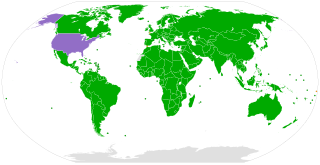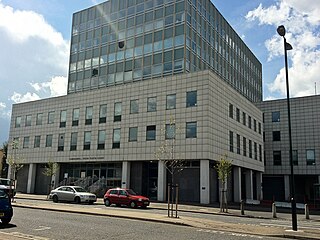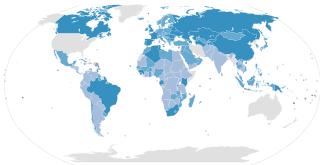
The United Nations Convention on the Rights of the Child is a human rights treaty which sets out the civil, political, economic, social, health and cultural rights of children. The Convention defines a child as any human being under the age of eighteen, unless the age of majority is attained earlier under national legislation.
In law, a minor is a person under a certain age, usually the age of majority, which legally demarcates childhood from adulthood. The age of majority depends upon jurisdiction and application, but it is generally 18. Minor may also be used in contexts that are unconnected to the overall age of majority. For example, the drinking age in the United States is usually 21, and younger people are sometimes called minors in the context of alcohol law, even if they are at least 18. The term underage often refers to those under the age of majority, but it may also refer to persons under a certain age limit, such as the drinking age, smoking age, age of consent, marriageable age, driving age, voting age, etc. Such age limits are often different from the age of majority
The Children's Rights Movement is a historical and modern movement committed to the acknowledgment, expansion, and/or regression of the rights of children around the world. It began in the early part of the last century and has been an effort by government organizations, advocacy groups, academics, lawyers, lawmakers, and judges to construct a system of laws and policies that enhance and protect the lives of children. While the historical definition of child has varied, the United Nations Convention on the Rights of the Child asserts that "A child is any human being below the age of eighteen years, unless under the law applicable to the child, majority is attained earlier." There are no definitions of other terms used to describe young people such as "adolescents", "teenagers" or "youth" in international law.
Children's rights are the human rights of children with particular attention to the rights of special protection and care afforded to minors. The 1989 Convention on the Rights of the Child (CRC) defines a child as "any human being below the age of eighteen years, unless under the law applicable to the child, majority is attained earlier." Children's rights includes their right to association with both parents, human identity as well as the basic needs for physical protection, food, universal state-paid education, health care, and criminal laws appropriate for the age and development of the child, equal protection of the child's civil rights, and freedom from discrimination on the basis of the child's race, gender, sexual orientation, gender identity, national origin, religion, disability, color, ethnicity, or other characteristics. Interpretations of children's rights range from allowing children the capacity for autonomous action to the enforcement of children being physically, mentally and emotionally free from abuse, though what constitutes "abuse" is a matter of debate. Other definitions include the rights to care and nurturing. There are no definitions of other terms used to describe young people such as "adolescents", "teenagers", or "youth" in international law, but the children's rights movement is considered distinct from the youth rights movement. The field of children's rights spans the fields of law, politics, religion, and morality.
The following outline is provided as an overview of and topical guide to children:

A juvenile court is a tribunal having special authority to pass judgements for crimes that are committed by children or adolescents who have not attained the age of majority. In most modern legal systems, children or teens who commit a crime are treated differently from legal adults that have committed the same offense.

The legal working age is the minimum age required by law for a person to work, in each country or jurisdiction.
The youth rights movement in the United States has long been concerned with civil rights and intergenerational equity. Tracing its roots to youth activism during the Great Depression in the 1930s, the youth rights movement has influenced the civil rights movement, opposition to the Vietnam War, and many other movements. Since the advent of the Internet, youth rights is gaining predominance again.
The following is a list of youth topics.
Juvenile law pertains to those who are deemed to be below the age of majority, which varies by country and culture. Usually, minors are treated differently under the law. However, even minors may be prosecuted as adults.
Articles related to children's rights include:

The youth rights movement seeks to grant the rights to young people that are traditionally reserved for adults, due to having reached a specific age or sufficient maturity. This is closely akin to the notion of evolving capacities within the children's rights movement, but the youth rights movement differs from the children's rights movement in that the latter places emphasis on the welfare and protection of children through the actions and decisions of adults, while the youth rights movement seeks to grant youth the liberty to make their own decisions autonomously in the ways adults are permitted to, or to lower the legal minimum ages at which such rights are acquired, such as the age of majority and the voting age.

The timeline of young peoples' rights in the United States, including children and youth rights, includes a variety of events ranging from youth activism to mass demonstrations. There is no "golden age" in the American children's rights movement.
In psychology, maturity is the ability to respond to the environment aware of the correct time and location to behave and knowing when to act, according to the circumstances and the culture of the society one lives in. Adult development and maturity theories include the purpose in life concept, in which maturity emphasizes a clear comprehension of life's purpose, directedness, and intentionality, which contributes to the feeling that life is meaningful.
The rights of children living in New Zealand are secured through various pieces of legislation. These include the Children's Commissioner Act 2003 (CCA), and the Children, Young Persons, and Their Families Act 1989 (CYPFA), the Care of Children Act 2004, the Education Act 1989, the New Zealand Bill of Rights Act 1990 (NZBORA), the Crimes Act 1961, the Human Rights Act 1993, the Privacy Act 1993, and the Official Information Act 1982 (OIA). The laws and policies comply with the United Nations Convention on the Rights of the Child (UNCRC), which New Zealand ratified on 6 April 1993.

Juvenile Justice Act, 2015 has been passed by Parliament of India amidst intense controversy, debate and protest on many of its provisions by Child Rights fraternity. It replaced the Indian juvenile delinquency law, Juvenile Justice Act, 2000, and allows for juveniles in conflict with Law in the age group of 16–18, involved in Heinous Offences, to be tried as adults. The Act came into force from 15 January 2016.
The Islamic Republic of Iran signed the UN Convention on the Rights of the Child (CRC) in 1991, and ratified it in 1994. Upon ratification, Iran made the following reservation: "If the text of the Convention is or becomes incompatible with the domestic laws and Islamic standards at any time or in any case, the Government of the Islamic Republic shall not abide by it."








